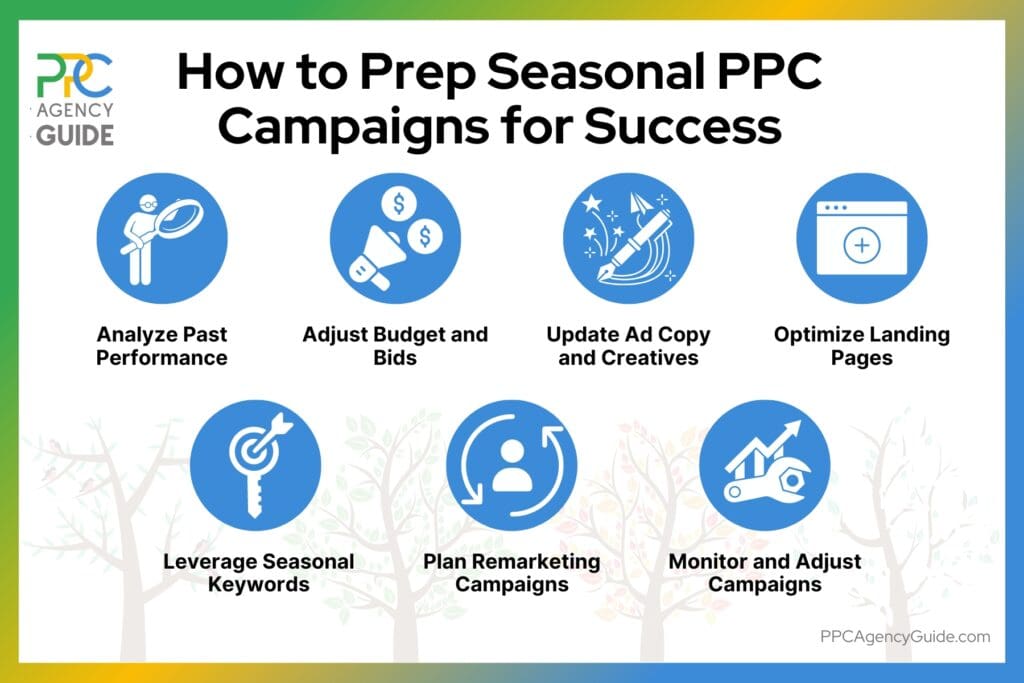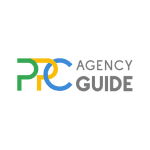
Have you ever wondered why your pay-per-click (PPC) campaigns perform like rockstars during certain times of the year but fall flat during others? Welcome to the world of seasonality in PPC advertising, where timing is everything. Understanding these seasonal fluctuations in consumer behavior and market trends can make the difference between a successful campaign and a missed opportunity. On this page, we’ll explore how seasonality works and walk you through some tips to help your seasonal PPC campaigns flourish so you can get maximum return on investment (ROI) all year long.
Seasonality in PPC Explained
Seasonality in PPC advertising refers to the fluctuations in consumer behavior and market trends based on different times of the year. These changes can greatly impact the performance of PPC campaigns. Seasonal trends might include holidays like Christmas and Halloween, back-to-school periods, summer vacations, or specific industry-related events like tax season for financial services or Black Friday for retail.
Understanding seasonality is crucial because consumer demand can vary widely throughout the year. For example, a retailer might see a spike in online searches and purchases around the holiday season, while a travel agency might experience higher traffic during the summer months. By recognizing these patterns, businesses can adjust their seasonal marketing strategies to optimize ad spend and increase returns during peak times.
A practical example is the retail sector during Black Friday and Cyber Monday, both prime online sales peak seasons. Recently, Black Friday generated almost $10 billion in sales in the U.S. alone, per CNBC. This data highlights the importance of ramping up PPC efforts to capture the increased online traffic and consumer spending during such periods.
How to Prep Seasonal PPC Campaigns for Success
Preparing for a seasonal change in PPC campaigns requires strategic planning and execution to align with seasonal consumer behavior and maximize returns. It’s not just about knowing when your peak times are but also about understanding how to adapt your campaigns to leverage these periods effectively. In the following sections, we’ll break down essential strategies—from analyzing past performance and adjusting budgets to updating ad copy and leveraging seasonal keywords—that will help you optimize your PPC efforts and achieve success during any seasonal shift.

1. Analyze Past Performance
Conduct PPC seasonal trends analysis by examining campaign data from prior years to identify trends and patterns. Focus on metrics like click-through rates (CTR), conversion rates, and return on ad spend (ROAS). Then, compare seasonal performance against baseline metrics to set realistic goals and expectations.
For example, a fashion retailer might review how their summer and winter collections performed in past years to determine which products were most popular and which ads generated the highest engagement.
2. Adjust Budget and Bids
Effective PPC budget planning for seasonal changes involves increasing your budget for high-demand periods and reducing it during slower times. Ensure you have sufficient funds to cover peak season traffic. Also, adjust your bids as part of PPC bid management for seasonal competitiveness. Consider using automated bidding strategies to optimize for conversions.
For instance, an e-commerce business might increase its PPC budget during the holiday season to capture more traffic from gift shoppers and adjust bids to stay competitive against other retailers.
3. Update Ad Copy and Creatives
Update your ad copy and visuals to reflect the upcoming season. Use relevant imagery, colors, and messaging. Highlight seasonal promotions, discounts, and special offers as part of your seasonal ad campaign optimization. Create a sense of urgency with phrases like “Holiday Sale” or “Limited Time Offer.”
For instance, a healthcare provider could use festive imagery, offer winter wellness specials, and remind people to leverage insurance benefits before the year rolls over in their winter PPC ads.
4. Optimize Landing Pages
Ensure your landing pages reflect holiday marketing tactics for PPC, including seasonal themes and promotions. Consistency between ads and landing pages improves user experience and conversion rates. Also, ensure your landing pages are mobile-friendly and load quickly, as mobile traffic tends to increase during holidays and vacations.
For example, a travel agency should update its landing pages to showcase winter vacation packages prominently, ensuring they are optimized for mobile users who may be browsing on-the-go.
5. Leverage Seasonal Keywords
Use tools like Google Keyword Planner to identify seasonal keywords that align with consumer search behavior. Incorporate these keywords into your campaigns, ad copy, and landing pages to improve relevance and visibility.
For instance, a fitness brand might target keywords like “New Year fitness goals” or “holiday workout plans” as the New Year approaches.
6. Plan Remarketing Campaigns
Segment your audience based on their interactions with your site and ads. Create tailored remarketing campaigns for different segments. Use dynamic remarketing to show personalized ads featuring products or services that users previously viewed.
For instance, a tax specialist can use remarketing to target visitors who browsed their tax preparation services but didn’t sign up, showing them ads for their services until the cutoff for filing occurs.
7. Monitor and Adjust Campaigns
Continuously monitor campaign performance and make real-time adjustments to bids, budget, and targeting. Conduct A/B tests on different ad copies, creatives, and landing pages to determine what resonates best with your audience.
For example, a transportation company that hires seasonal employees might test different ad variations for their job fair to see which ones drive the highest engagement and conversions.

Get Help with Your Seasonal PPC Strategies
An experienced PPC agency can bring expertise and insights into optimizing ad strategies tailored to your peak periods to ensure you get the maximum return on your investment. Agencies also have access to advanced tools and analytics to effectively manage budgets, adjust bids, and create compelling, season-specific ad copy and creatives to maximize each campaign’s impact. If you’d like to be matched with an agency that has a proven track record and understands your industry, request a complimentary consultation.
FAQs About Seasonal PPC Campaigns
How does seasonal consumer behavior impact PPC campaigns?
Seasonal consumer behavior impacts PPC campaigns by influencing the demand for certain products or services at different times of the year. During peak seasons, such as holidays or back-to-school periods, consumers are more likely to search for and purchase related items. This increased demand can lead to higher competition and ad costs, influenced by digital advertising trends during holidays. Businesses can capitalize on these trends by adjusting their ad budgets, targeting, and creatives to align with seasonal preferences, ensuring they capture the heightened consumer interest and maximize conversions.
What are the best strategies for adjusting PPC budgets for seasonal changes?
Adjusting PPC budgets for seasonal changes involves several strategies:
- Historical Data Analysis: Review past performance to predict high-demand periods and allocate more budget during these times.
- Flexible Budgeting: Increase budgets during peak seasons and reduce them during off-peak times to optimize spend.
- Automated Bidding: Use automated bidding strategies to adjust bids in real-time based on seasonal fluctuations and competition.
- Promotion Alignment: Synchronize budget increases with seasonal promotions and sales events to maximize impact.
- Geographic Targeting: Allocate more budget to regions experiencing seasonal demand, such as promoting winter gear in colder areas.
How can I tailor my PPC ads for summer?
To tailor PPC ads for summer:
- Seasonal Themes: Use bright, vibrant visuals and language that evoke summer activities and feelings.
- Targeted Keywords: Focus on summer-related keywords like “vacation deals,” “summer fashion,” or “outdoor activities.”
- Promotions: Highlight summer sales, discounts, or special offers.
- Mobile Optimization: Ensure ads and landing pages are mobile-friendly, as users are often on the go.
- Audience Segmentation: Target demographics interested in summer activities, such as travelers, outdoor enthusiasts, or families planning vacations.
- Ad Copy: Emphasize the benefits and experiences of your products or services in the summer context.
What steps should I take to optimize my PPC campaigns for winter?
To optimize PPC campaigns for winter:
- Seasonal Keywords: Incorporate winter-related keywords like “holiday gifts,” “winter clothing,” or “New Year’s resolutions.”
- Festive Ad Creatives: Use cozy, festive visuals and holiday-themed ad copy.
- Promotions: Offer holiday discounts, bundles, and special deals.
- Mobile-Friendly Pages: Ensure landing pages are optimized for mobile users who often shop on the go.
- Retargeting: Use retargeting to reach previous visitors and remind them of holiday deals.
- Post-Holiday Strategies: Plan campaigns around New Year’s resolutions and clearance sales to maintain engagement after the holidays.
Why is it important to analyze past PPC performance before a seasonal change?
Analyzing past PPC performance before a seasonal change is crucial for understanding trends and identifying what worked or didn’t work in previous campaigns. This analysis helps businesses predict consumer behavior, allocate budgets effectively, and create targeted ads that resonate with seasonal demands. By learning from historical data, businesses can make informed decisions, optimize their strategies, and avoid repeating past mistakes, ultimately improving their campaign performance and ROI during peak seasons.
What are some effective ways to use seasonal keywords in PPC campaigns?
Effective ways to use seasonal keywords in PPC campaigns include:
- Keyword Research: Use tools like Google Keyword Planner to identify relevant seasonal keywords.
- Ad Copy Integration: Incorporate seasonal keywords naturally into your ad copy to improve relevance and click-through rates.
- Landing Page Alignment: Ensure your landing pages are optimized for the same seasonal keywords to enhance user experience and conversions.
- Dynamic Keyword Insertion: Use dynamic keyword insertion to automatically update ads with relevant seasonal terms, making them more personalized.
- Monitor Trends: Continuously monitor keyword performance and adjust bids and targeting based on real-time data.
How can remarketing be used effectively in seasonal PPC campaigns?
Remarketing can be used effectively in seasonal PPC campaigns by targeting users who have previously visited your site or interacted with your ads but didn’t convert. Tailor your remarketing ads to reflect the current season, offering special promotions, reminders, or showcasing products they viewed. Use dynamic remarketing to display personalized ads featuring the specific items they browsed. This approach keeps your brand top-of-mind, encourages repeat visits, and increases the likelihood of conversions during peak seasonal periods.
What role do ad copy and creatives play in seasonal PPC campaigns?
Ad copy and creatives play a crucial role in seasonal PPC campaigns by capturing the attention of consumers and conveying timely, relevant messages that resonate with their current needs and interests. Seasonal ad copy should reflect the themes and sentiments of the time, such as holiday cheer or summer fun, while creatives should use appropriate imagery and colors. This alignment enhances engagement, improves click-through rates, and ultimately drives higher conversions by appealing to consumers' seasonal motivations and emotions.
Why should businesses consider working with a PPC agency for seasonal campaigns?
Businesses should consider working with a PPC agency for seasonal campaigns because agencies bring specialized expertise and experience in optimizing ad strategies for peak periods. They can effectively manage budgets, adjust bids, and create compelling, season-specific ad content. Agencies also have access to advanced tools and analytics, providing deeper insights and more efficient campaign management. This expertise helps businesses maximize their return on investment and achieve better results during critical seasonal periods.
How can travel businesses leverage PPC during peak travel times?
Travel businesses can capitalize on seasonal trends by partnering with a travel-focused PPC agency that understands the nuances of the industry. These agencies can help optimize ad strategies around peak travel periods, ensuring campaigns align with vacation booking trends and consumer search behavior. For example, leveraging keywords related to “summer vacation deals” or “winter getaways” can boost visibility during high-demand seasons, driving better engagement and ROI.


















